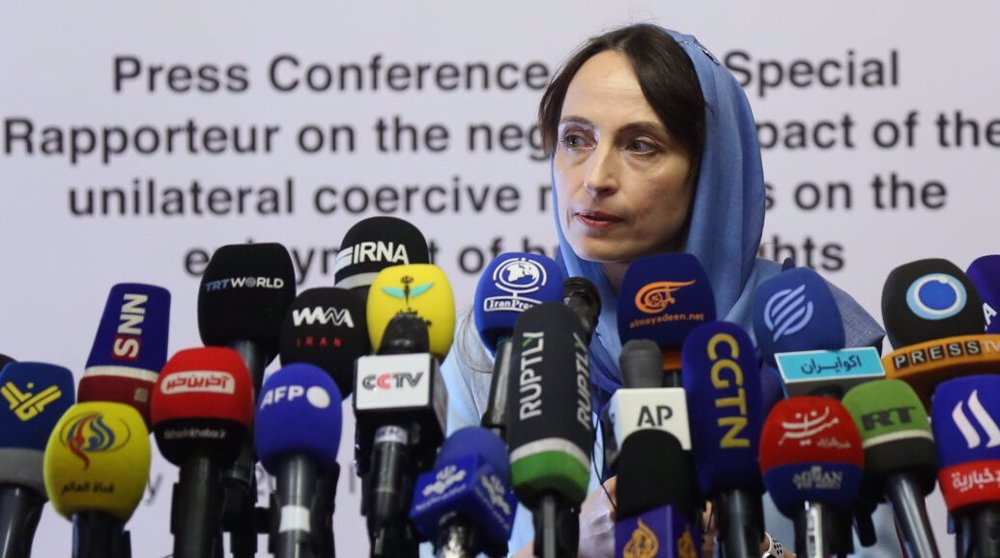
Tehran, May 19 (RHC)-- A top UN human rights official has slammed the United States for its brutal sanctions regime against the Islamic Republic of Iran, asserting that harsh economic sanctions have had a damaging impact on human rights in the country.
Alena Douhan, the United Nations Special Rapporteur on the Negative Impact of Unilateral Coercive Measures on the Enjoyment of Human Rights, who is on an official visit to Iran these days, convened a press conference in Tehran on Wednesday afternoon.
Speaking to reporters, Douhan noted that decades of sanctions have wholly affected Iranian people’s lives and have particularly hit the low-income section of the society.
While presenting her assessment of the unilateral coercive measures (UCM) against Iran, the UN official who works under a mandate from the United Nations Human Rights Council, called on Washington to abandon its hard-nosed policy of maximum pressure against Iran and other countries.
Douhan, who arrived in Tehran earlier this month, said she had met with many civil society members, representatives of financial centers, diplomatic community during her visit. She said she will address her concerns about the legality of U.S. sanctions in her final report, which will be released at a later date.
Douhan’s mission from May 7th to the 18th is the first to Iran by a UN special rapporteur. Before embarking on the trip, the UN official said she hoped to "gather first-hand information on the impact of unilateral coercive measures on the full realization of all human rights" in Iran.
"My visit will aim at covering all walks of life and sectors affected by such measures," she noted, dismissing speculation in the Western media that she was heading to Iran with a specific agenda. She told reporters on Wednesday that the U.S. has since the 1970s imposed crippling economic and trade sanctions on Iran and significantly expanded them since the early 2000s.
In May 2018, the former U.S. President Donald Trump, after unilaterally withdrawing his country from the 2015 nuclear deal, reinstated harsh economic sanctions on Iran and slapped new ones in an unprecedented move that was widely decried.
Under the 2015 agreement, officially known as the Joint Comprehensive Plan of Action (JCPOA), international sanctions on the Islamic Republic were eased in exchange for Tehran putting limitations on certain aspects of its nuclear activities.
Trump’s sanctions deprived the Islamic Republic of economic dividends under the accord as it barred countries and international firms from working with Iran.
The mercurial real estate tycoon-turned-president's successor, Joe Biden, who was vice president when the JCPOA was inked in 2015, promised to return his country to the deal. But his administration has failed to honor the commitment, following Trump's legacy.
A top Iranian human rights official says a UN rapporteur’s visit to Iran is only aimed at gathering information on the impact of sanctions on the Islamic Republic.
According to the UN special rapporteur, the U.S. continues to illegally ban trade and investment in Iran, forcing foreign companies to leave the country for the fear of sanctions. Douhan's landmark visit to Iran came amid the stalemate over the nuclear deal, with the U.S. showing reluctance to respond to Iran's proposals.
Decrying the U.S. decision to abandon the nuclear deal and continue with its sanctions regime, she said the deal was endorsed by UN Security Council Resolution 2231. “Applying extraterritorial sanctions on Iranian companies or companies working with Iran … is illegal under international law,” she asserted.
Commenting on Iran's frozen assets abroad, the UN official said the assets estimated to be around $120 billion need to be unblocked. “I urge the states that have frozen the assets of Iranian Central Bank to immediately unfreeze Iran’s funds based on international law.”
Douhan began her 11-day visit to Iran on May 7, a day before the fourth anniversary of the U.S. illegal withdrawal from the JCPOA. Last week, Iran’s top human rights official Kazem Gharibabadi said Douhan’s visit was only aimed at gathering information on the impact of sanctions to hold countries (US) to account.
“Nations hit by sanctions should use all available resources to hold the countries calling for and enforcing unilateral sanctions liable,” Gharibabadi said.
His comments came in response to reports in Western media accusing Iran of exploiting the visit to avoid accountability and “deflect attention” from its alleged human rights violations. In her Wednesday press conference, Douhan also welcomed Iran’s efforts to support Afghan refugees, displaced by the 20-year U.S. war, despite reeling under sanctions.
“I call on the sanctioning states, particularly the United States, to abandon the unilateral sanctions,” she stated.
She also referred to stalled negotiations in Vienna to bring the US back to the JCPOA, urging the JCPOA signatories and the U.S. to resume the negotiations.”
Iran and the P4+1 group of countries – Britain, France, Germany, China, and Russia – have held several rounds of sanctions in the Austrian capital since April 2021 to revive the JCPOA. Iran says its primary goal at the talks is to have the illegal US sanctions removed.

